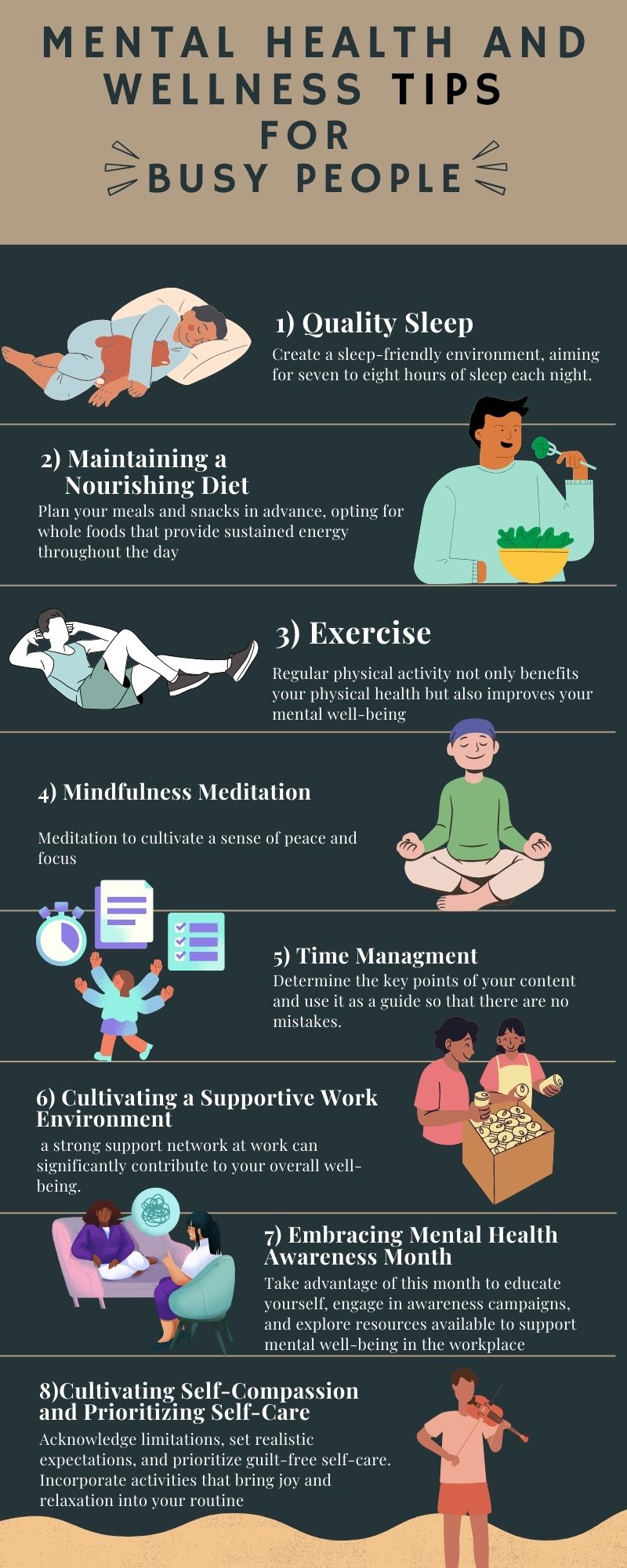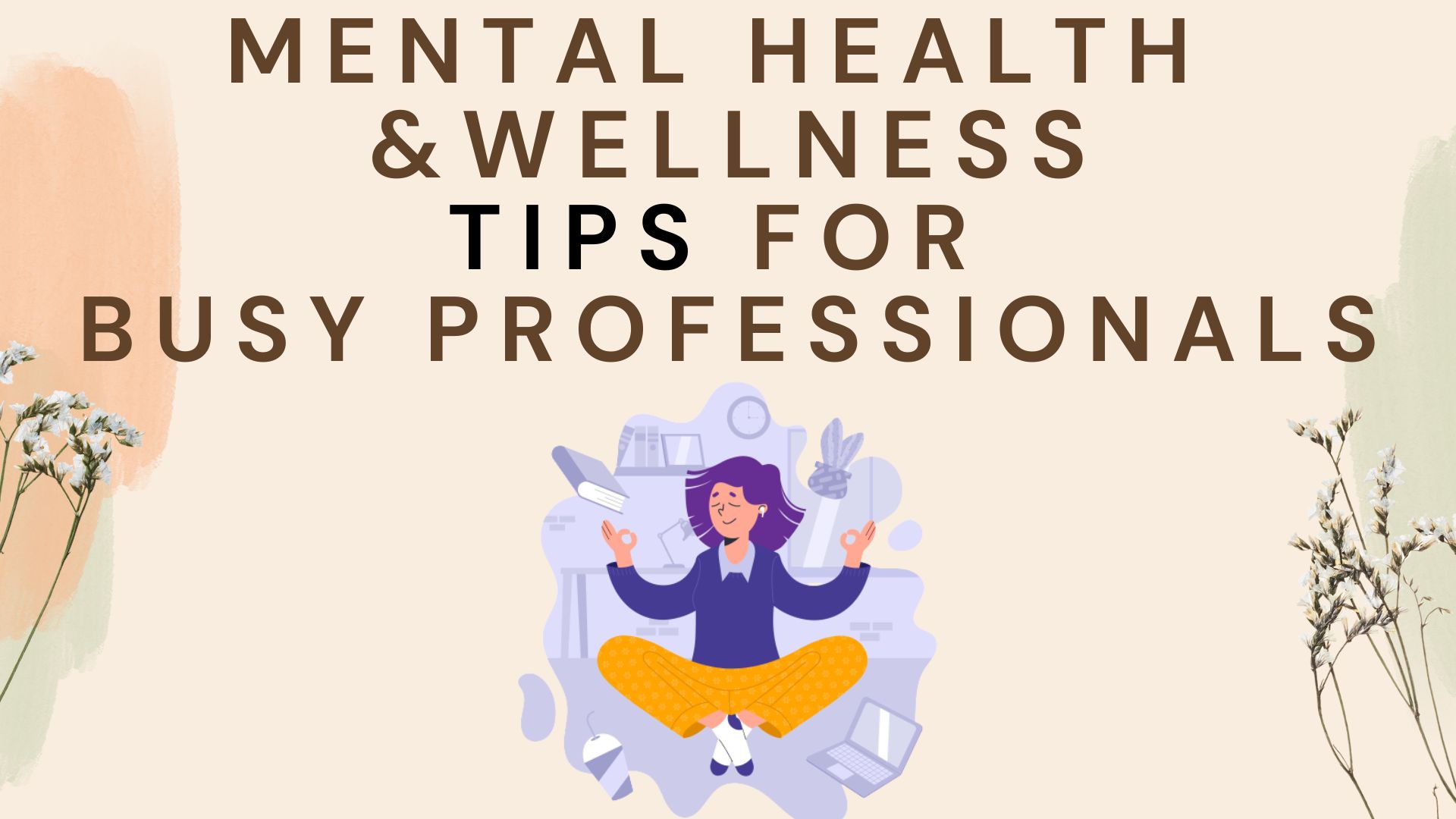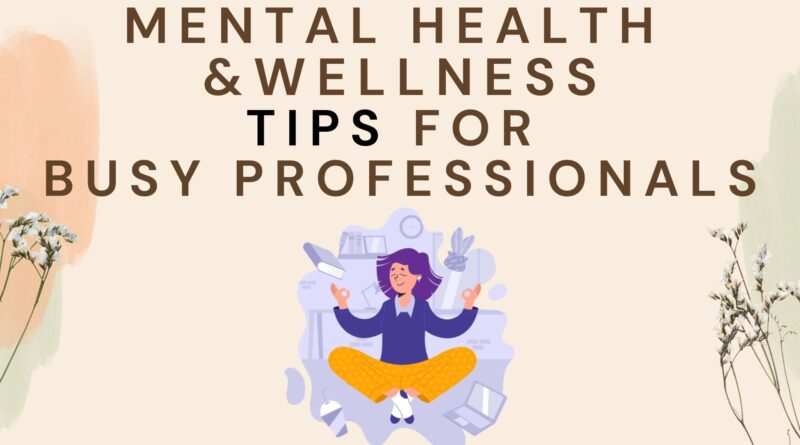In today’s fast-paced work culture, mental health at work is often overlooked. Busy professionals tend to prioritize work over their own well-being, leading to burnout and long-term health issues. However, taking care of mental health is crucial for maintaining productivity and achieving success.
This article presents 10 proven strategies for mental health and wellness at work, even with a demanding schedule. From stress management to a healthy lifestyle, these tips will help busy professionals find balance, thrive, and prioritize their mental health at work.

1. Understanding the Significance of Mental Health at Work
Employee mental health is key for a thriving work environment. It affects productivity, satisfaction, and engagement. Organizations should prioritize employee mental health by fostering work-life balance, offering benefits, and promoting open communication. By investing in employee well-being, organizations create a positive workplace, resulting in improved productivity and overall success.
Prioritizing mental health is vital for busy professionals. It impacts focus, decision-making, and stress management. By recognizing its importance, you lay the groundwork for a healthier work-life balance. Incorporating wellness tips for busy people into your routine empowers you to thrive personally and professionally, ensuring optimal performance and well-being.
2. Managing Stress and Anxiety
Stress and anxiety often plague busy professionals, impacting their well-being and productivity. To effectively combat these challenges, incorporating stress management techniques into your daily routine is essential. Practice deep breathing exercises to achieve a state of calmness and relaxation.
Practice mindfulness meditation to cultivate a sense of peace and focus. Additionally, find solace in activities you enjoy, such as listening to soothing music or taking short walks during breaks. These simple yet powerful relaxation techniques will surely benefit the employees and their mental health at work.
3. Prioritize Sleep
Getting quality sleep is crucial for mental health in the workplace. Follow these tips for better sleep:
- Establish a consistent bedtime routine.
- Create a sleep-friendly environment: cool, dark, and quiet.
- Limit screen time before bed.
- Practicing relaxation techniques like deep breathing or progressive muscle relaxation is key to relaxing your mind.
By prioritizing sleep, you enhance your mental well-being. It’s essential to create a supportive workplace that spreads mental health awareness and provides resources for better sleep.
4. Maintaining a Nourishing Diet:
A nourishing diet is vital for supporting employee mental health in the workplace. Here are some practical tips for a diet that you can easily follow in your daily routine:
- Start the day with a balanced breakfast: Include whole grains, protein, and fruits/vegetables.
- Pack homemade lunches and snacks: Opt for lean proteins, and colorful veggies, and avoid processed options.
- Stay hydrated: Keep a water bottle at your desk and limit sugary drinks.
- Encourage healthy eating in the workplace: Establish shared fruit bowls, organize nutritious potlucks, or provide access to healthy snacks.
- for more such Tips Click Here
How Does Diet Affect Mental Health?
Diet plays a significant role in mental health. Nutrient deficiencies and unhealthy eating patterns can negatively impact brain function and mood regulation. Conversely, a nourishing diet rich in whole foods, vitamins, and minerals supports optimal brain health, enhances mood stability, and promotes overall mental well-being.
5. Making Time for Exercise:
Incorporating exercise into your routine can significantly enhance your mental health at work. Try high-intensity interval training (HIIT) workouts or take active breaks throughout the day to promote physical activity. You can also explore alternative modes of transportation like walking or cycling to work. Regular exercise releases endorphins reduces stress, and improves mood, ultimately leading to increased productivity and overall well-being.
6. Embracing Mental Health Awareness Month
Mental Health Awareness Month, observed in May, provides a valuable opportunity to increase awareness and understanding of mental health issues. Take advantage of this month to educate yourself, engage in awareness campaigns, and explore resources available to support mental well-being in the workplace. Participate in workshops, webinars, or community events to gain insights and promote mental health awareness initiatives.
7. Seeking Professional Help for Mental Health at Work
While self-care strategies are crucial, it’s important to recognize when professional help is necessary. If you experience persistent symptoms of mental health issues, such as prolonged sadness, anxiety, or difficulty functioning, consider seeking support from a mental health professional. They can provide guidance, therapy, or medication if needed. Seeking help is a sign of strength and a proactive step towards improving your well-being. One may even opt for online therapy as a convenient mode of seeking professional help for mental health.
8. Cultivating Self-Compassion and Prioritizing Self-Care
Acknowledge limitations, set realistic expectations, and prioritize guilt-free self-care. Incorporate activities that bring joy and relaxation into your routine, such as reading, spending time with loved ones, pursuing hobbies, or enjoying nature. These moments of rejuvenation are essential for maintaining balance and overall well-being.
9. Utilizing Time Management Techniques
To strike a balance between work and self-care, it is crucial to master time management techniques. Firstly, prioritize your tasks and delegate responsibilities whenever possible. Secondly, establish clear boundaries to prevent overworking. Additionally, utilizing tools such as calendars, to-do lists, and productivity apps can help you organize your schedule effectively.
Lastly, allocate dedicated time for self-care activities. By efficiently managing your time, you can create a healthy work-life balance and give due importance to your mental health at work.
10. Cultivating a Supportive Work Environment
Building a supportive work environment can greatly impact your mental health. To achieve this, foster open communication with colleagues and superiors, creating an atmosphere where discussions about mental health are encouraged. Additionally, prioritize breaks and establish a culture that values work-life balance. also, the Home environment is a crucial part of mental health
Moreover, engage in team-building activities or social events to foster connections and reduce stress. Remember, a strong support network at work can significantly contribute to your overall well-being, creating a positive and supportive work environment.

FAQs Related With Mental Health At Work
What are some quick relaxation techniques that busy people can use?
If you have a busy schedule, try incorporating quick relaxation techniques into your routine. Deep breathing exercises, progressive muscle relaxation, and visualization techniques can help reduce stress and promote relaxation.
Additionally, taking short breaks throughout the day to stretch, go for a walk, or practice mindfulness can also be beneficial for your mental health.
How can I make time for exercise with a busy schedule for good mental health?
Making time for exercise with a busy schedule can be challenging, but there are ways to incorporate physical activity and mental activity into your routine. Consider waking up earlier to fit in a morning workout, scheduling exercise sessions like appointments in your calendar, or breaking up workouts into shorter sessions throughout the day.
Also, choosing physical activities you enjoy can make it easier to stick with an exercise routine.
When should I seek professional help for my mental health?
If you experience persistent symptoms of mental health issues, such as prolonged sadness, anxiety, or difficulty functioning, consider seeking support from a mental health professional. Additionally, if your mental health is impacting your ability to perform daily activities or maintain relationships, seeking professional help is crucial.
Remember, seeking help is a sign of strength and a proactive step towards improving your well-being.
Conclusion
As a busy professional, prioritizing your mental health at work is essential for long-term success and happiness. Remember to seek professional help when needed and cultivate self-compassion throughout your journey. By investing in your mental health, you’ll not only enhance your personal well-being but also improve your professional performance and satisfaction.
Embrace these strategies, make them a part of your routine, and embark on a journey of holistic well-being amidst the demands of your professional life.
Disclaimer: This News/Content is sourced from third-party websites & published for information purposes only, Live Enhanced does not claim or guarantee the truth.




